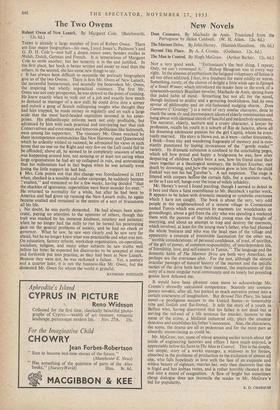The Two Owens
Robert Owen of New Lanark. By Margaret Cole. (Batchworth. 12s. 6d.) THERE is already a large number of lives of Robert Owen. There are four major biographies—his own, Lloyd JoneS's, Padrnore's and G. D. H. Cole's—and half a dozen minor ones, besides studies in ,Welsh, Dutch, German and French. It is temerarious of Margaret Cole to write another; but her temerity is in the end justified. In the first place, her book is better written and easier to read than the others; in the second, she has some new things to say.
11 It has always been difficult to reconcile the portraits biographers give us of the two Owens. There is first Mr. Owen of New Lanark, the successful businessman, and secondly the benevolent Mr. Owen, the inspiring but wholly unpractical visionary. The first Mr. Owen was not only prosperous, he was shrewd to the point of cunning. He knew exactly when to walk out of a job and exactly how much to demand as manager of a new mill; he could drive into a corner and outwit a gang of Scotch milloyming toughs who thought they had him trapped; he made money so regularly and on such a large scale that the most hard-headed capitalists invested in his enter- prises. His philanthropic reforms were not only profitable, but advanced by him with such practical and convincing tact that rich Conservatives; and even mean and timorous politicians like Sidmouth, ,were among his supporters. The visionary Mr. Owen wrecked by sheer incompetence communities like New Harmony and Queenwood ,which he ardently wished to succeed; he advocated his views in such terms that no one on the Right and very few on the Left could fail to be offended; above all, he seemed to be completely unaware of what ,was happening around him, not noticing or at least not caring when large organisations he had set up collapsed in ruin, and announcing that his millennium had in fact begun when he was actually even losing the little support he had had.
Mrs. Cole points out that this change was foreshadowed in 1817 when, checked in a sensible and sober campaign, he suddenly became ,`exalted," and remained so for a few weeks, having decided "that the shackles of ignorance, superstition were burst asunder for ever." He returned to normality for a while, but after he had been to America and had given up running the New Lanark mills, he again became exalted and remained in the centre of a sort of brainstorm all his life.
I, No doubt, he was partly deiriented. He had always been auto- cratic, paying no attention to the opinions of others, though this trait was masked by his immense kindness, courtesy and patience; when he no longer had the mills to run he turned his penetrating gaze on the general problems of society, and he had no check or governor. What he saw, he saw very clearly and he saw very far ahead, but he no longer knew what was practicable and what was not. On education, factory reform, workshop organisation, co-operation, socialism, religion, and many other subjects he saw truths well before his time; he expected, his discoveries to be accepted at once and forthwith put into practice, as they had been at New Lanark. Because they were not, he was reckoned a failure. Yet, a century and a quarter later, it is not the business-like Mr. Owen, but the demented Mr. Owen for whom the world is grateful.
RAYMOND POSTDATE
































 Previous page
Previous page